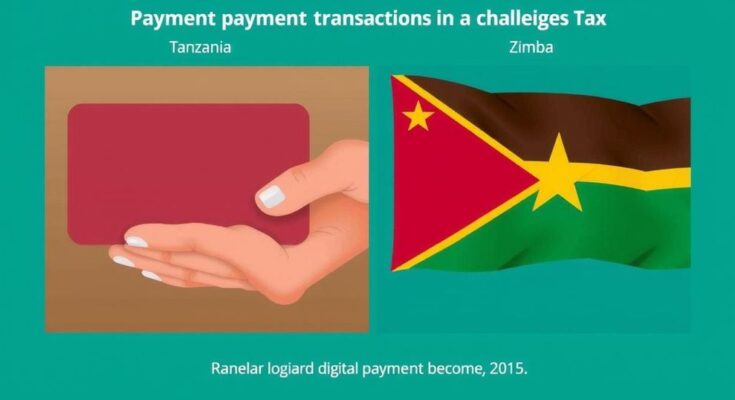Tanzania has abolished fees on card payments to stimulate digital transactions, whereas Zimbabwe’s 2% Integrated Money Transfer Tax has diminished the adoption of electronic payments. While Tanzania currently enjoys 48.4% digital payment usage, Zimbabwean policies have led to a resurgence in cash preference as the financial burden discourages consumers from engaging in cashless transactions.
In a significant move to enhance digital transactions, Tanzania has eliminated charges on card payments, a strategy aimed at fostering a cash-less economy. This initiative, overseen by the Bank of Tanzania, applies to all forms of card payments at point-of-sale machines, implementing penalties for merchants who fail to comply. Currently, approximately 48.4% of Tanzania’s population is engaging in digital payments, driven by increased smartphone penetration and greater financial inclusion, reflecting a positive trend towards modern transaction methods.
In stark contrast, Zimbabwe is witnessing a regression in digital payment adoption due to the imposition of the Integrated Money Transfer Tax (IMTT) by Finance Minister Mthuli Ncube. Introduced in 2018, this 2% tax has deterred consumers from opting for electronic transactions, leading to an increased reliance on cash. The tax stemmed from the government’s desire to capitalize on the burgeoning volume of digital transactions, but instead, it has reversed the progress achieved in shifting towards a cash-lite economy.
Reflecting on past experiences, Zimbabwe once boasted that electronic money comprised 70% of all payments in 2017. However, since the implementation of the IMTT, many individuals have reverted to cash to avoid incurring additional costs associated with digital payments. This financial burden, compounded by bank fees, has made cash the preferred option, undermining the advantages of cashless transactions.
Ironically, even as the Zimbabwean government promotes the benefits of digital transactions, the financial structure complicates this transition. With many banks and providers relying heavily on fees from digital payments, any move to eliminate these charges could destabilize their revenue models, leading to resistance against such reform. Thus, similar to the trajectory taken by Tanzania, the feasibility of promoting digital payments in Zimbabwe remains uncertain without substantial policy changes.
The landscape of digital payments in sub-Saharan Africa has seen varying approaches, particularly highlighted by the contrasting policies of Tanzania and Zimbabwe. Tanzania’s recent decision to abolish fees associated with card payment transactions is a proactive measure to stimulate electronic payments, enhancing accessibility and user experience. On the other hand, Zimbabwe’s recent history with digital payments has been marred by oppressive taxation, which has stifled growth and posed significant barriers for consumers and businesses alike. This situation illustrates the importance of supportive government policies in fostering a thriving cash-less environment.
In conclusion, while Tanzania emerges as a positive example of digital payment promotion through the removal of transaction fees, Zimbabwe’s experience highlights the detrimental effects of excessive taxation on electronic transactions. If Zimbabwe were to consider similar reforms by eliminating IMTT and banking fees, it may invigorate the digital payment sector greatly. Until then, the reliance on cash will likely continue, driven by the financial impediments in place.
Original Source: www.techzim.co.zw




